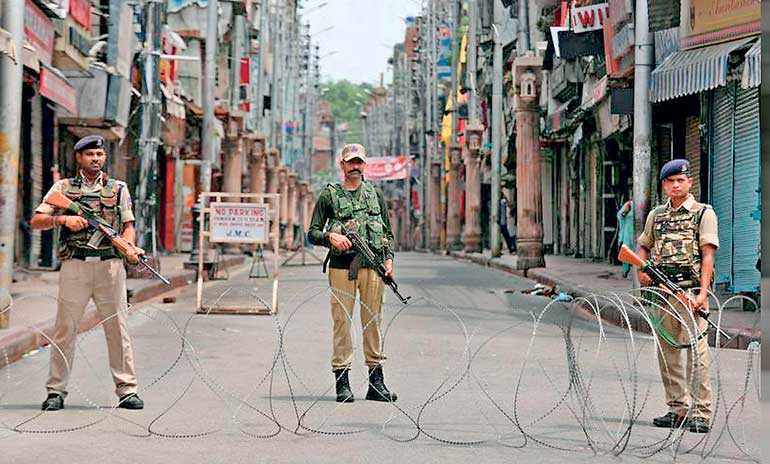Friday Feb 20, 2026
Friday Feb 20, 2026
Tuesday, 6 August 2019 01:55 - - {{hitsCtrl.values.hits}}

NEW DELHI (Reuters): India on Monday revoked the special status of Kashmir, the Himalayan region that has long been a flashpoint in ties with neighbouring Pakistan, as it moves to fully integrate its only Muslim-majority region with the rest of the country.
In the most far-reaching political move in one of the world’s most militarised regions in nearly seven decades, India said it would scrap a Constitutional provision that allows its state of Jammu and Kashmir to make its own laws.
“The entire Constitution will be applicable to Jammu and Kashmir,” Interior Minister Amit Shah told Parliament, as Opposition lawmakers voiced loud protests against the repeal.
The Government also lifted a ban on property purchases by non-residents, opening the way for Indians to invest and settle there, just as they can elsewhere in India, although the measure is likely to provoke a backlash in the region.
Pakistan, which also claims Kashmir, said it strongly condemned the decision, which is bound to further strain ties between the nuclear-armed rivals.
“As the party to this international dispute, Pakistan will exercise all possible options to counter the illegal steps,” its Foreign Ministry said in a statement.
India and Pakistan have fought two of their three wars over Kashmir, convulsed by a nearly 30-year armed revolt in which tens of thousands of people have died, with hundreds of thousands of Indian troops deployed to quell it.
India blames that rebellion on Pakistan, which denies the accusation, saying that it backs the right to self-determination for Kashmir.
There were no immediate details of Kashmiris’ reaction to the decisions by New Delhi.
Hours earlier the Indian Government launched a security crackdown in the region, arresting regional leaders and suspending telephone and internet services and restricting public movement in the main city of Srinagar.
Prime Minister Narendra Modi and his Hindu nationalist Bharatiya Janata Party (BJP) had pushed for radical political change in Kashmir even before he won re-election in May, saying its laws hindered integration with the rest of India. “Politically, it’s advantage BJP,” said Happymon Jacob, a professor at Jawaharlal Nehru University in the Indian capital. “The scrapping of Article 370 of the Constitution is likely to set off a slew of political, constitutional and legal battles, not to speak of the battles on the streets of Kashmir.” Monday’s move reflects Modi’s muscular approach to national security. In February, he ordered war planes into Pakistan after a militant group based there claimed responsibility for a deadly attack on a military convoy in Kashmir. That step, in turn, prompted a retaliatory raid by Pakistan.
Introduced decades ago, the Constitutional provisions reserved Government jobs and college places for Kashmir’s residents, among other limits aiming to keep people from other parts of the country from overrunning the state.
The Government has also decided to split the state into two federal territories, one formed by Jammu and Kashmir, and the other consisting of the enclave of Ladakh, citing internal security considerations.
“Today marks the darkest day in Indian democracy,” said one of the leaders placed under house arrest, a former chief minister of Jammu and Kashmir Mehbooba Mufti.
“It will have catastrophic consequences for the subcontinent,” she said in a post on Twitter.
India’s Interior Ministry ordered all states to put security forces on “maximum alert” to maintain public order and quash the spread of any rumours.
Modi’s BJP General Secretary Ram Madhav hailed the Government’s actions as ushering in a “glorious day”. In Modi’s western home state of Gujarat, people shouted slogans of support on the streets. In Pakistani-controlled areas of the region, however, there was anger at India, with protests extending to the capital, Islamabad and the southern commercial centre of Karachi. In Muzaffarabad, 45 km (28 miles) from the two countries’ contested border, dozens of protesters held black flags and burnt car tyres, chanting “Down with India”.
Tension had risen in Kashmir since Friday, when Indian officials issued an alert over possible militant attacks by Pakistan-based groups. Pakistan rejected those assertions, but thousands of alarmed Indians left the region over the weekend.